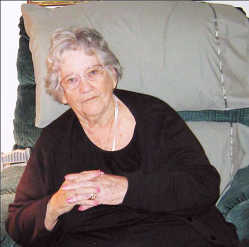Authorities optimistic five-year-old McVey murder case will still be solved
Five years ago this week the calm of Greencastle's northeastside condominium community was shattered by the fatal shooting of an 85-year-old woman who lived alone, by all accounts had no enemies and seemed the unlikeliest of targets to meet such a heinous end.
Essie McVey was shot once in the back of her head with a small-caliber handgun on Aug. 30, 2011. She died two days later. Her murder has never been solved.

It was 9 o'clock on a weekday morning on a quiet street, not exactly the kind of setting where someone is going to randomly show up and commit a violent act.
Nothing appeared taken at McVey's Autumn Glen Village condo. The scene was void of ransacking.
No one reported hearing the gunshot or seeing anyone suspicious in the area. No forced entry was apparent. And little physical evidence was left behind.
Five years hence, little more than that is really known about the puzzling case.
Yet Putnam County Prosecutor Timothy Bookwalter remains hopeful that the case may be solved and solved sometime soon.
After care-givers and relatives were all routinely cleared in the case, the long-held theory emerging was that a lone perpetrator -- perhaps the same man involved in a robbery case in Greencastle earlier that same year -- was the likely murderer.
The investigation, however, has moved away from that theory, Bookwalter said.
"I would say there are persons -- plural -- persons of interest," he told the Banner Graphic, assuring that the only unsolved Greencastle murder during his tenure as prosecutor is never far from his mind.
"We discuss it every week," Bookwalter said, noting that investigator David Meadows and Greencastle City Police Det. Michael Collins have interviewed scores of people about the case. "I'm sure Michael and David discuss it daily," he added.
Late last fall, Bookwalter said, he and GPD Chief Tom Sutherlin talked about the McVey murder and "agreed to put some extra resources into it."
While cold cases can just get colder as they sit with nothing happening, Bookwalter and Sutherlin didn't want to see that occur. They gave Collins and Meadows all the physical evidence to go over again, and they have put in "hundreds of hours since the first of the year," the prosecutor noted.
And it paid off when it was discovered some evidence collected at the scene was never actually tested for DNA.
That has been turned over to the Indiana State Police Lab for testing, Bookwalter said, a process that normally takes about 45 days once it is put in front of a forensic investigator. The DNA has been in the lab's hands for five months now, Bookwalter said, so he's hoping that the results are forthcoming.
Jason Fajt, a veteran ISP investigator from Greencastle, is "spearheading the return of the DNA results" to the prosecutor's office, Bookwalter said.
Most of the theories on the motive in the case have centered on "some sort of burglary or robbery," Bookwalter noted, adding that the victim possibly either walked in on someone inside her home or they went in to burglarize the place not knowing she was still there.
The elderly woman was home at her condo that morning, waiting for her home health care worker to make a scheduled visit. Authorities know the health care nurse phoned Mrs. McVey at 9:01 to verify she was coming.
However, the nurse got behind in her other stops and had to call back at 10:17 to advise she'd be late.
She got no answer and continued to call the house while driving over, concerned that McVey was sick or unable to get to the phone.
The home health care worker arrived at the condo at 10:35, finding the front door unlocked but not open. Inside she discovered the victim, barely alive, on the floor of the living room-dining room area.
Immediately she dialed 911, and Operation Life and Greencastle police arrived simultaneously a few minutes later.
So 76 minutes remain unaccounted for, investigators have noted of the 9:01-10:17 a.m. timeframe from when the victim was OK and answering the phone to when authorities were aware the incident had already taken place.
The crime was likely committed in search of money, valuables or prescription drugs, investigators still believe.
One of the problems with the prescription drugs portion of the theory, the prosecutor noted, has been determining how much of her prescription she had on hand and how many pills she had been using.
With Meadows and Collins actively revisiting the case for several months, they recently showed their superiors what they have come up with.
"They presented their findings to Tom (Chief Sutherlin), (Assistant Chief) Brian Hopkins and myself," Bookwalter said, "and I think we all felt good about what they had."
That's another reason he remains hopeful about solving the McVey murder case
"On the surface," the prosecutor said, "you might not hear a lot about it, but we're grinding away, doing the yeoman work that it takes to investigate any murder.
"I'm optimistic," Bookwalter said, "I really am."
Optimistic enough that he thinks the case is closer to being solved than before?
"I do," he said, sitting up straight as if he were posturing to punctuate his point. "I do."
